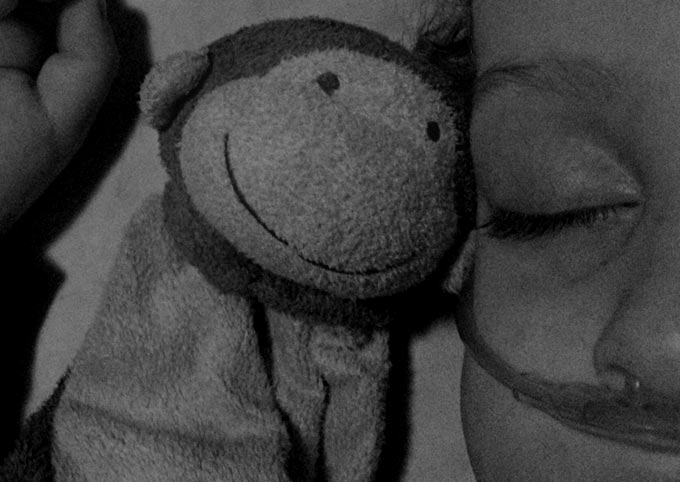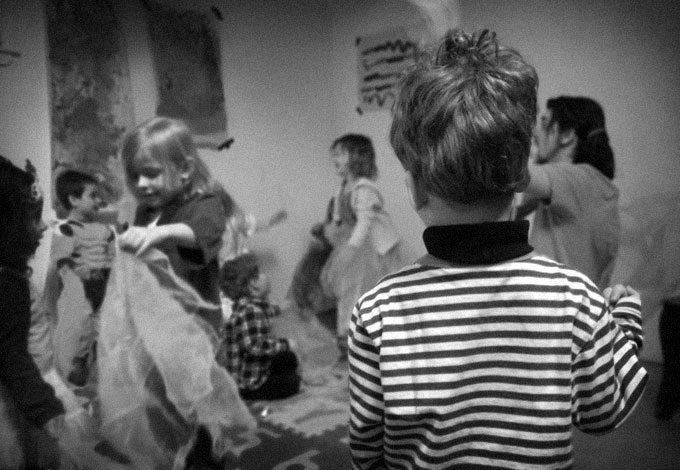An update to yesterday's post: after this morning's three-hour ABA session and one hour off O2, C's oxygen level was 80%. This is very low (read: not good). So, while his progress is positive overall, it's clear that any extra activity is still over-taxing his pulmonary system. Small steps, small steps.
Missing Monkey
 I feel terrible. Tonight when I put C in bed, he wouldn't stop crying. I asked him what was wrong, but he couldn't respond coherently. I knew he was exhausted after a full day of therapy, so I rubbed his back until he drifted off.
I feel terrible. Tonight when I put C in bed, he wouldn't stop crying. I asked him what was wrong, but he couldn't respond coherently. I knew he was exhausted after a full day of therapy, so I rubbed his back until he drifted off.
It wasn't until an hour later that I realized what was bothering him: I'd left his monkey downstairs. This is the monkey he carries with him everywhere, the monkey that's been with him since the beginning. This is the monkey he treasures so much that we actually have a backup just in case. This is the monkey that, for a while, C referred to as "Munchee."
C, sometimes I wish I could understand you better. I really do.
But it's not his fault. I should have been paying closer attention. I brought monkey upstairs and put him right where he belongs.
Outside Looking In

Here is a photo that breaks a tiny bit of my heart.
It was taken yesterday at a third birthday party for one of the girls in C's preschool. The children—including C's twin—were engaged in dancing, singing, pretend play, and other group activities. Meanwhile, C was mostly on the outside, the periphery, looking in, standing to the side, his little hand curled in something I think of as a manual question mark.
But maybe I'm painting an unfair picture of the situation: C wasn't hiding, and he wasn't in a corner. He wasn't frightened and he wasn't resistant. He was watching the children, observing, taking it all in. In fact, several times he did participate, in his own unique way. And he was clearly enjoying himself.
Still, it's painful to realize that this isn't the picture of typical childhood shyness or fear; this is autism...and I'm just going to have to learn to be okay with that.
Peter
When I was in middle school, there was a boy named Peter who was constantly being bullied. He was slight, with straight sandy blonde hair that framed large, dark eyes. He wore a navy blue puffy coat and backpack at all times, even in class, even in summer. The bounce in his walk was not happy but jerky. He was what we'd then describe as "slow," but in hindsight it's clear to me that Peter was somewhere on the autism spectrum. The only class I shared with Peter was a photography classes. He would try to keep to himself, but when the teacher was out of the room, some contingent of kids would begin their taunts. They'd yank his backpack off until it spilled its contents on the floor. A few girls would pretend to flirt with him only to end up ridiculing him in some terrible way. On one particularly sad occasion, a kid convinced Peter to eat photographic paper, which he promptly threw up.
Throughout it all, Peter was passive; he'd lower his head, look at the ground, shuffle his feet. Occasionally he'd yell in anger, but mostly he just took it. I only saw him cry once, and I remember the tears leaving streaks in the thin layer of grime on his face.
A few of us would try to defend Peter, and our efforts would usually result in a short reprieve. But sooner or later the bullies would be back at it, seemingly unable to resist the primal urge to torment this child who was just a little different from the rest of us.
As a father, I know that Peter probably had a family who loved him, a family who would have been devastated had they known what was happening to their son.
It's with an undiluted sense of sadness and horror that these memories come back to me now. I'd mostly put them out of my mind until I began to notice little similarities between Peter and my son, C. And lately I've been wondering what happened to Peter, what scars this treatment left on his seemingly gentle soul. If I'm honest, the images this conjecture generates are not particularly positive.
...
I will do whatever I can to protect C from facing the things Peter faced, but I know I can't be there all the time; like the middle school teacher, there will be times I have to step out of the room. This thought fills me with dread.
Growing Apart
 Our twins, M and C, have been together since inception, near each other always, except for brief stints when C was hospitalized for lung disease.
Our twins, M and C, have been together since inception, near each other always, except for brief stints when C was hospitalized for lung disease.
They are close in many ways; they even look enough alike that people often ask if they're identical (they're not). But since C began retreating into his own world, they began to have parallel lives. They are usually near each other physically, yet there is a distance between them as each goes about his own activities.
It's clear M and C love each other, and that gives me great hope.
Therapies began in earnest a couple of months ago, requiring C to be apart from his brother for hours at a time. The distance increased.
And now we're beginning to accept that they won't be going to preschool together next year: C will go to a school with a program that is best for his needs, and M will go elsewhere. Their days will be spent apart, and the distance will increase.
I can already envision the day when M comes home and tells us about his new best friend, someone not C. I will be happy for M; he deserves that. But I will also feel heartbroken for C, who may or may not understand what this means.
We'd always dreamed our twin boys would grow up as best friends and lifelong compatriots, two people who know each other in ways no outsider ever could; I hold out hope that will still be the case, that it's still possible.
But illness, autism, and now the school system have put a wall between these brothers, a wall I'm hoping will come tumbling down if we just work hard enough.
